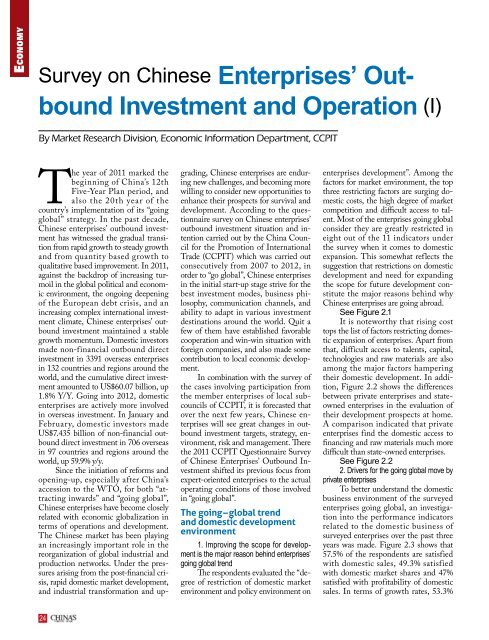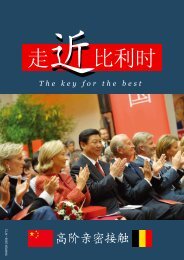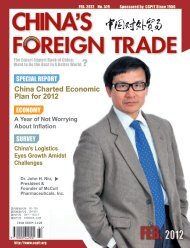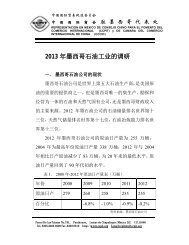ECONOMYConcerns about financial instabilityin jurisdictions where the financialcrisis remains unresolved, includingmuch of continental Europe at the timeof writing, can easily lead to excessiveforbearance as has been the case inseveral past episodes of systemic bankingfragility, such as in Japan in the1990s. For example, large continentalEuropean countries such as Germanyand France were widely reported as beingreluctant to tighten the definitionof capital and impose higher minimumcapital requirements in the negotiationof the Basel III Accord and in thesubsequent discussion of SIFI (systemicallyimportant financial institution)surcharges. Similarly, the first draft ofthe EU legislation transposing Basel IIIsoftens some of the Basel Committee’stightening of the definition of capital,and prohibits the voluntary applicationof higher capital requirements by individualmember states. The same factorwas at play when European policymakersforced the IASB in October 2008 toamend the IAS 39 standard on financialinstruments and allow more flexibilityin the classification of financial instrumentsby struggling European banks.This is especially important as the EuropeanUnion prepares to introduce legislationon banking crisis managementand resolution. A proposal is expectedfrom the European Commission inearly 2012. It is arguably impossible toeliminate moral hazard from bankingsector policy frameworks, but it is arguablyeven more difficult to prevent itwhen such frameworks are prepared in aclimate of systemic instability.The risk of populism complementsthat of forbearance, and the two canbe simultaneous. As the ongoing crisiscreates a political demand for action,and action at a fundamental level is preventedby the bias towards forbearance,policymakers can be tempted to adopta punitive attitude toward the financialsector, in response to popular perceptionsrather than in-depth policy analysis.This has arguably been the case withinitiatives, particularly in the EuropeanUnion, to put hard limits on the scope ofremuneration practices in the financialindustry and to impose specific taxationon aspects of financial activity. In certaincases, such impulses can be alignedwith strategies of “financial repression,”namely the forced investment of domesticsavings in government securities,or in other forms of repression of marketmechanisms for price setting andcapital allocation, such as the attemptsto discourage some forms of hedgingagainst sovereign risk or to suspend thepublication of credit rating decisionsaffecting troubled countries. Given thecomplexity of financial regulation, it canbe difficult to disentangle such populistmotivations from other drivers of financialreform. Nevertheless, they are likelyto gain in prominence if the Europeancrisis worsens and leads to more financialand economic dislocation.Furthermore, embarking in longtermfinancial reform while a majorfinancial crisis is still ongoing andunresolved creates a risk of irrelevanceof the corresponding legislative andregulatory initiatives, to the extentthat the eventual crisis resolution canbe expected to usher in a new round ofreform to ensure that “it never happensagain.” Examples in the EuropeanUnion are the successive rounds ofamendments to the Capital RequirementsDirective of 2006, or the threeconsecutive regulations to create atighter legal framework for the activityof credit rating agencies.Each of these three factors, incertain circumstances, can contributepositively to the quality of policymaking.Forbearance can be a rational calculationto minimize financial dislocation,even though it increases moral hazard.Populism can help assert the autonomyof financial reform against pressurefrom the financial industry. Successiverounds of regulatory reform can result ingradual improvements of the regulatoryframework and correction of past missteps.But each of them can also easilyhave negative consequences in terms ofthe sustainability and efficiency of thefinancial policy framework.Financial systems and growthFinally, one of the most openquestions of all is how the post-crisisfinancial reform agenda might affect theability of the financial sector to contributeto overall economic growth. Thisissue too has multiple dimensions.As mentioned above, the consequencesof tighter capital requirementson economic growth have been a matterof heated controversy in the context ofthe preparation of Basel III, with a starkcontrast between simulations conductedby the financial industry that predicted adevastating effect of the proposed ruleson future output (IIF 2010), and thoseof the supervisory community that forecasteda much milder impact (MAG2010 and BCBS 2010a). Ultimately, theG-20 leaders implicitly endorsed theBasel committee’s more sanguine assessmentwhen they adopted Basel III atthe November 2010 Seoul Summit.However, this quantitative argumentfails to capture the complexityof the impact of financial reform ongrowth. In most countries in the developedworld at least, large companieshave fairly easy access to internationalcapital markets, and their funding conditionsare not overly affected by domesticregulatory frameworks. Smaller companiesand other borrowers, by contrast,including younger firms which havethe greatest growth potential, have nosuch access, and their ability to mobilizeexternal finance is likely to be most affectedby financial reforms. What is atstake is not just the aggregate volumeof credit, but how this credit is allocatedby heterogeneous intermediariestowards heterogeneous firms and otherborrowers. Regulated banks are onlyone part of this picture, which includesthe loosely defined “shadow bankingsystem” and interacts with the broadereconomy in ways that existing economicmodels generally fail to describe comprehensively.In particular, the impact of the ongoingmovement towards re-regulationon global financial integration couldmaterially impact economic trends, tothe extent that financial openness is associatedwith higher levels of economicgrowth. Also, how regulation mightencourage or limit competition amongfinancial intermediaries, innovation infinancial services, and the allocation ofcapital to risky new ventures, remainspoorly understood, especially given thelarge number of interrelated recent orongoing financial reform initiatives.(Author: from Peterson Institutefor International Economics)22
ECONOMYSurvey on Chinese Enterprises’ OutboundInvestment and Operation (I)By Market Research Division, Economic Information Department, CCPITThe year of 2011 marked thebeginning of China’s 12thFive-Year Plan period, andalso the 20th year of thecountry’s implementation of its “goingglobal” strategy. In the past decade,Chinese enterprises’ outbound investmenthas witnessed the gradual transitionfrom rapid growth to steady growthand from quantity based growth toqualitative based improvement. In 2011,against the backdrop of increasing turmoilin the global political and economicenvironment, the ongoing deepeningof the European debt crisis, and anincreasing complex international investmentclimate, Chinese enterprises’ outboundinvestment maintained a stablegrowth momentum. Domestic investorsmade non-financial outbound directinvestment in 3391 overseas enterprisesin 132 countries and regions around theworld, and the cumulative direct investmentamounted to US$60.07 billion, up1.8% Y/Y. Going into 2012, domesticenterprises are actively more involvedin overseas investment. In January andFebruary, domestic investors madeUS$7.435 billion of non-financial outbounddirect investment in 706 overseasin 97 countries and regions around theworld, up 59.9% y/y.Since the initiation of reforms andopening-up, especially after China’saccession to the WTO, for both “attractinginwards” and “going global”,Chinese enterprises have become closelyrelated with economic globalization interms of operations and development.The Chinese market has been playingan increasingly important role in thereorganization of global industrial andproduction networks. Under the pressuresarising from the post-financial crisis,rapid domestic market development,and industrial transformation and upgrading,Chinese enterprises are enduringnew challenges, and becoming morewilling to consider new opportunities toenhance their prospects for survival anddevelopment. According to the questionnairesurvey on Chinese enterprises’outbound investment situation and intentioncarried out by the China Councilfor the Promotion of InternationalTrade (CCPIT) which was carried outconsecutively from 2007 to 2012, inorder to “go global”, Chinese enterprisesin the initial start-up stage strive for thebest investment modes, business philosophy,communication channels, andability to adapt in various investmentdestinations around the world. Quit afew of them have established favorablecooperation and win-win situation withforeign companies, and also made somecontribution to local economic development.In combination with the survey ofthe cases involving participation fromthe member enterprises of local subcouncilsof CCPIT, it is forecasted thatover the next few years, Chinese enterpriseswill see great changes in outboundinvestment targets, strategy, environment,risk and management. Therethe 2011 CCPIT Questionnaire Surveyof Chinese Enterprises’ Outbound Investmentshifted its previous focus fromexpert-oriented enterprises to the actualoperating conditions of those involvedin “going global”.The going-global trendand domestic developmentenvironment1. Improving the scope for developmentis the major reason behind enterprises’going global trendThe respondents evaluated the “degreeof restriction of domestic marketenvironment and policy environment onenterprises development”. Among thefactors for market environment, the topthree restricting factors are surging domesticcosts, the high degree of marketcompetition and difficult access to talent.Most of the enterprises going globalconsider they are greatly restricted ineight out of the 11 indicators underthe survey when it comes to domesticexpansion. This somewhat reflects thesuggestion that restrictions on domesticdevelopment and need for expandingthe scope for future development constitutethe major reasons behind whyChinese enterprises are going abroad.See Figure 2.1It is noteworthy that rising costtops the list of factors restricting domesticexpansion of enterprises. Apart fromthat, difficult access to talents, capital,technologies and raw materials are alsoamong the major factors hamperingtheir domestic development. In addition,Figure 2.2 shows the differencesbetween private enterprises and stateownedenterprises in the evaluation oftheir development prospects at home.A comparison indicated that privateenterprises find the domestic access tofinancing and raw materials much moredifficult than state-owned enterprises.See Figure 2.22. Drivers for the going global move byprivate enterprisesTo better understand the domesticbusiness environment of the surveyedenterprises going global, an investigationinto the performance indicatorsrelated to the domestic business ofsurveyed enterprises over the past threeyears was made. Figure 2.3 shows that57.5% of the respondents are satisfiedwith domestic sales, 49.3% satisfiedwith domestic market shares and 47%satisfied with profitability of domesticsales. In terms of growth rates, 53.3%24

















